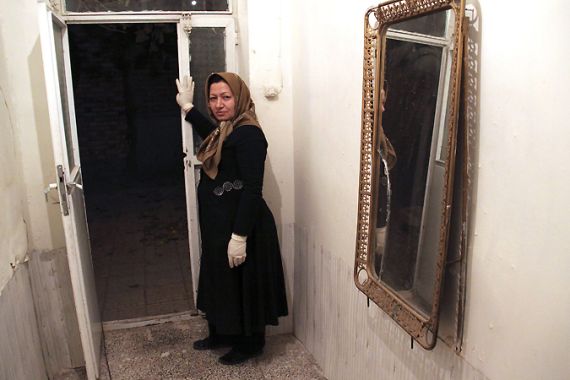Iran denies freeing condemned woman
Press TV denies reports that Sakineh Mohammadi Ashtiani, sentenced to death by stoning, has been freed by regime.

 |
| Images released by state-controlled TV show that Ashtiani was released, but no official confirmation was issued [AFP] |
Sakineh Mohammadi Ashtiani, the Iranian woman whose sentence of death by stoning sparked global outrage, has not been been freed from jail, Iran’s English language Press TV has said.
A German campaign group said on Thursday that Ashtiani had been released after photographs apparently showing her at home with her son appeared in the media.
But state-run Press TV said on Friday that Ashtinai had been taken to the house to carry out a reconstruction of the alleged murder of her husband, and was not free.
“Contrary to a vast publicity campaign by Western media that confessed murderer Sakineh Mohammadi Ashtiani has been released, a broadcast production team with the Iran-based Press TV has arranged with Iran’s judicial authorities to follow Ashtiani to her house to produce a visual recount of the crime at the murder scene,” Press TV said on its website.
The channel said it would air the programme, which includes interviews with people involved in case, at 2035GMT on Friday.
Campaigners wrongfooted
The news will come as a blow to campaigners who were celebrating Ashtiani’s release. When photographs of her at home emerged on Thursday, campaigners hailed them as evidence of a “historic” victory.
Patty Debonitas, a spokesperson for the International Committee Against Stoning (ICAS), one of the main groups which campaigned on behalf of Ashtiani, told Al Jazeera that the campaign had been a success.
“It’s a historical success because the international outcry worked,” Debonitas said on Thursday. But it appears that the group was wrongfooted by the photographs.
Ghanbar Naderi, an Iranian journalist said that the fact that Ashtiani was allowed out of prison at all could be seen as a positive development.
“She has been released temporarily to retell her story and reenact the events that led to the murder of her husband,” he said. She hasn’t been released for good- she only helped a documentary crew to make a documentary about her case. This might be good news, because she might be released.”
Ashitani has been sentenced to death twice. The first court decision to hang her for the murder of her husband was commuted to a 10-year jail sentence by an appeals court in 2007.
But she was later condemned to die by stoning for adultery, a sentence which was upheld by another appeals court.
The European Union called has called Ashtiani’s sentence “barbaric,” while the Brazilian government offered her asylum.